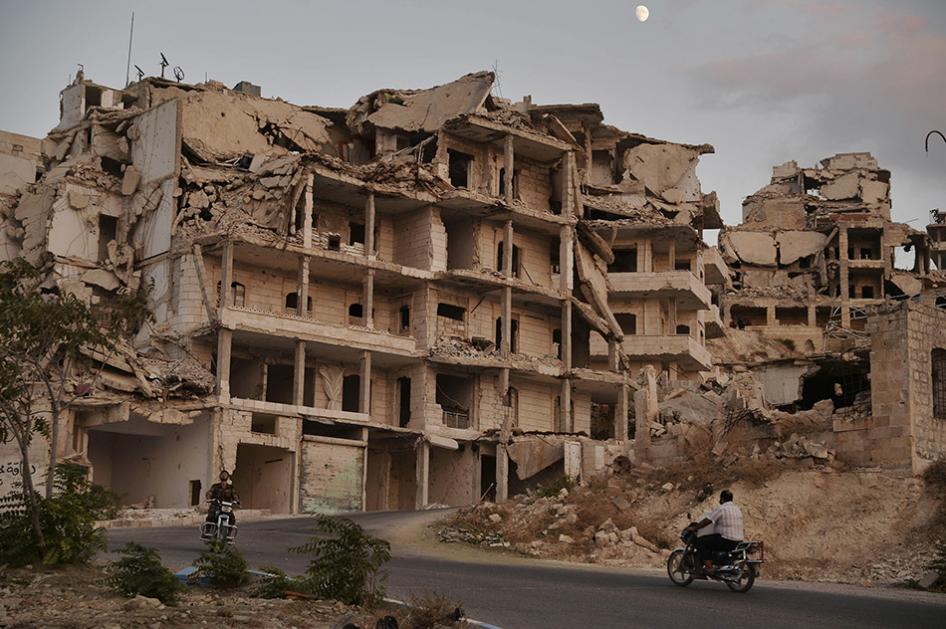The hum of an aircraft hovering above. An explosion. Children crying in terror as their parents pick them up and flee. Blood, dust, and destruction everywhere. It is an all too familiar sequence of events through the Syrian conflict, in Aleppo, Ghouta, and now, Idlib. Despite widespread condemnation of this familiar tragedy, not enough has been done to protect civilians in Syria. On April 26, the Syrian-Russian military alliance launched a long-anticipated offensive on Idlib and Northern Hama governorates, the last territories in Syria held by anti-government armed groups. The escalation comes after Russia and Turkey brokered a ceasefire in September 2018. Now, though, strikes have resumed, and with them, abject disregard for civilian life. More than 80 civilians have died in the last three weeks, according to the UN. Local monitors and activists registered hundreds of strikes per day on schools, hospitals and homes – civilian objects protected under international law. For the first time in almost two years, we have received reports of the Syrian government using their notorious barrel bombs. These weapons, which we last documented the government using in Aleppo in late 2016, are indiscriminate and have devastating effects on populated civilian areas.
May 15, 2019

By Sara Kayyali – HRW
The hum of an aircraft hovering above. An explosion. Children crying in terror as their parents pick them up and flee. Blood, dust, and destruction everywhere.
It is an all too familiar sequence of events through the Syrian conflict, in Aleppo, Ghouta, and now, Idlib. Despite widespread condemnation of this familiar tragedy, not enough has been done to protect civilians in Syria.
On April 26, the Syrian-Russian military alliance launched a long-anticipated offensive on Idlib and Northern Hama governorates, the last territories in Syria held by anti-government armed groups. The escalation comes after Russia and Turkey brokered a ceasefire in September 2018. Now, though, strikes have resumed, and with them, abject disregard for civilian life.
More than 80 civilians have died in the last three weeks, according to the UN. Local monitors and activists registered hundreds of strikes per day on schools, hospitals and homes – civilian objects protected under international law. For the first time in almost two years, we have received reports of the Syrian government using their notorious barrel bombs. These weapons, which we last documented the government using in Aleppo in late 2016, are indiscriminate and have devastating effects on populated civilian areas.
While these unlawful tactics are not new – we have documented them in Ghouta, Aleppo and elsewhere – in many ways, Idlib is special: half of its estimated three million inhabitants have been displaced at least once, fleeing after the Syrian government re-took Ghouta and Aleppo. With no other Syrian territory to move to due to restrictions on movement and fears of reprisals, and with Turkey’s border closed to refugees, the civilian population is forced to stay in a war zone.
On May 10, the United Nations Security Council expressed ‘grave concern’ at the developments in Idlib, and “urged all parties to uphold international humanitarian law and protect civilians.” These words are laudable, but more needs to be done.
Governments should make clear to Russia that so long as it continues to underwrite abuses by the Syrian government, there will be no business as usual with Moscow or Damascus, and that both Syria and Russia will be held accountable for their dangerous disregard for the lives of Syrians. The Security Council and governments should also provide assistance to and urge Turkey to use its influence with armed groups in Idlib to encourage compliance with international law, and to ensure that Turkey allows civilians fleeing the violence to reach safety across the border.
If history is any guide, we can all anticipate what the devastating cost will be for civilians in Idlib, if governments fail to act now.
